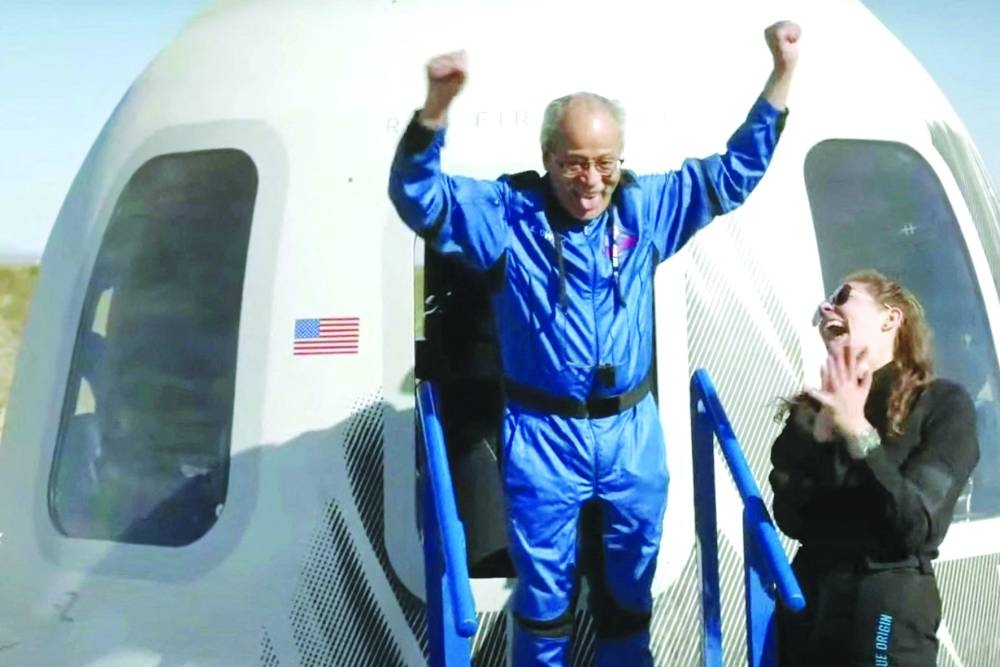After a nearly two year hiatus, Blue Origin flew adventurers to space yesterday, including a former Air Force pilot who was denied the chance to be the United States’ first black astronaut decades ago.It was the first crewed launch for the enterprise owned and founded by Amazon billionaire Jeff Bezos since a rocket mishap in 2022 left rival Virgin Galactic as the sole operator in the fledgling suborbital tourism market.Six people, including the sculptor Ed Dwight, who was on track to become the National Aeronautics and Space Administration (Nasa)’s first astronaut of colour in the 1960s before being controversially spurned, launched around 9.36am local time (1436 GMT) from the Launch Site One base in west Texas, a live feed showed.The passengers, also including a venture capitalist, were paying customers of Blue Origin’s space tourism business, though Dwight’s seat was sponsored by a space-focused nonprofit and a private foundation.Blue Origin has not disclosed how much it charges customers.Dwight – at 90 years, eight months and 10 days – became the oldest person to ever go to space.“This is a life-changing experience, everybody needs to do this,” he exclaimed after the flight.“I thought I didn’t really need this in my life,” he added, reflecting on his omission from the astronaut corps, which was his first experience with failure as a young man.“But I lied,” he said with a hearty laugh.Mission NS-25 is the seventh human flight for Blue Origin, which sees short jaunts on the New Shepard suborbital vehicle as a stepping stone to greater ambitions, including the development of a full-fledged heavy rocket and lunar lander.Including yesterday’s crew, the company has flown 37 people aboard New Shepard – a small, fully reusable rocket system named after Alan Shepard, the first American in space.The programme encountered a setback when a New Shepard rocket caught fire shortly after launch on September 12, 2022, even though the uncrewed capsule ejected safely.A federal investigation revealed an overheating engine nozzle was at fault.Blue Origin took corrective steps and carried out a successful uncrewed launch in December 2023, paving the way for yesterday’s mission.After liftoff, the sleek and roomy capsule separated from the booster, which produces zero carbon emissions. The rocket performed a precision vertical landing.As the spaceship soared beyond the Karman Line, the internationally recognised boundary of space 62 miles (100km) above sea level, passengers had the chance to marvel at the Earth’s curvature and unbuckle their seatbelts to float – or somersault – during a few minutes of weightlessness.The capsule then re-entered the atmosphere, deploying its parachutes for a desert landing in a puff of sand.However, one of the three parachutes failed to fully inflate, possibly resulting in a harder landing than expected.The US Federal Aviation Administration (FAA), which oversees launchsite safety and commercial rocket mishaps, did not immediately respond to questions about the New Shepard capsule’s parachute and whether the agency would investigate.Asked for comment, a Blue Origin spokesperson stressed its system was designed with multiple fail-safes. “The capsule is designed to safely land with one parachute. The overall mission was a success, and all of our astronauts are excited to be back.”In all, the mission lasted around 11 minutes.Bezos himself was on the programme’s first ever crewed flight in 2021.A few months later, Star Trek’s William Shatner blurred the lines between science fiction and reality when he became the world’s oldest ever astronaut at age 90, decades after he first played a space traveller.Dwight, who was almost two months older than Shatner at the time of his flight, became only the second nonagenarian to venture beyond Earth.Astronaut John Glenn remains the oldest to orbit the planet, a feat he achieved in 1998 at the age 77 aboard the Space Shuttle Discovery.Yesterday’s mission finally gave Dwight the chance he was denied decades ago.He was an elite test pilot when he was appointed by President John F Kennedy to join a highly competitive Air Force programme known as a pathway for the astronaut corps, but was ultimately not picked.Dwight left the military in 1966, citing the strain of racial politics, before dedicating his life to telling black history through sculpture.
Desenvolvido polo Complemento RSS Eco por CodeRevolution.


Comentarios recentes